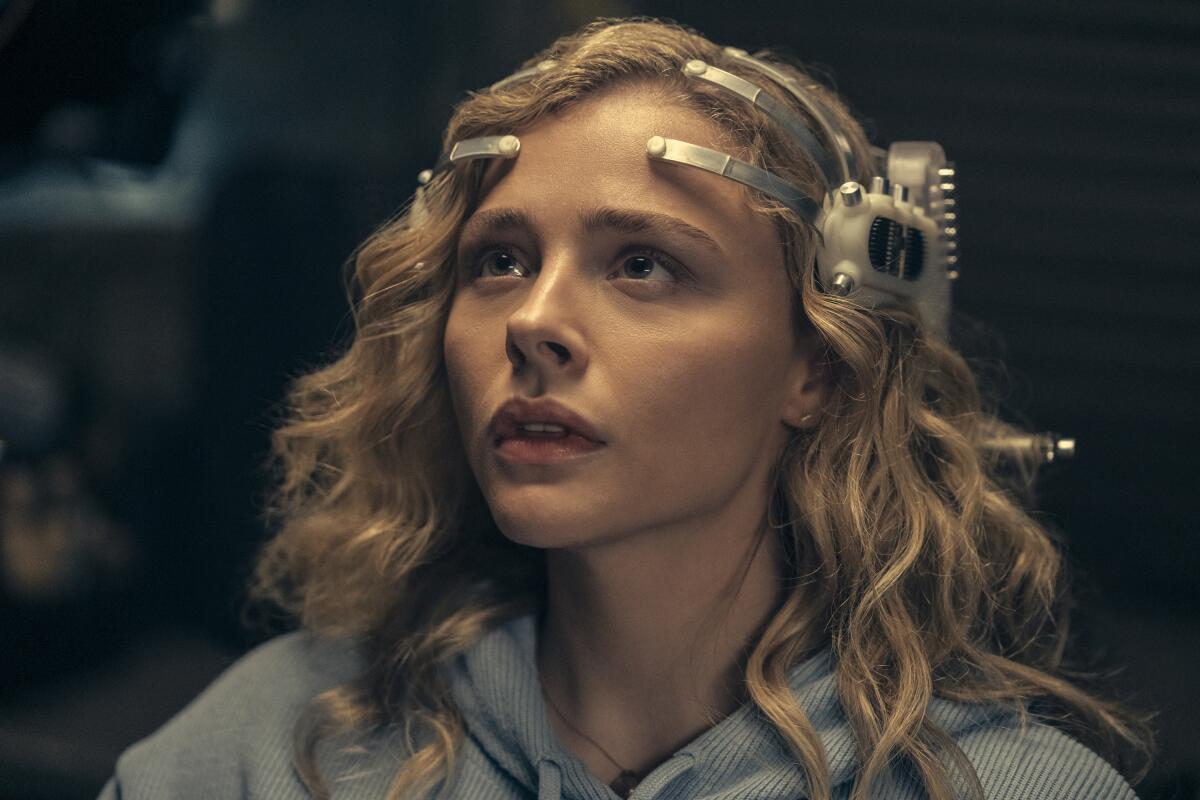The new series from the creators of ‘Westworld’ is more confusing than compelling

- Share via
Complex thought is mistaken for compelling storytelling in the technological dystopia of “The Peripheral,” Prime Video’s sci-fi drama about, well … I’m still trying to figure it out.
The series, out Friday, is set in the near and far future, the natural world and virtual reality, Appalachia and London. Connecting all these places and spaces is a new VR “game” so advanced that it blurs the line between the physical realm and the simulated experience, leaving players — and viewers of the show — incredibly confused.
If killer robots, wanton violence, time warps, and cyber-commerce’s commodification of rural America seem like familiar themes, it’s because they are. The series, created by Scott Smith and based on the 2014 book by William Gibson, is executive produced by “Westworld” creators Jonathan Nolan and Lisa Joy. And just like that HBO series, there’s a good story buried somewhere in “The Peripheral,” if one has the patience, focus, time and passion for tortuous, nano-tech nightmares.
The story is set primarily in near-future Appalachia, where unbridled capitalism means everything is commodified by just a few big businesses, the cost of basic prescription drugs is now in the thousands, and odd jobs in the gig economy are the only source of income for many Americans. Skilled VR gamers Flynne Fisher (Chloë Grace Moretz) and her brother Burton (Jack Reynor) are small-town mountain folk making a meager living playing games for wealthy benefactors, using their earnings to take care of their sick mother. When they’re sent an experimental headset for a new sim, they’re launched into a hyper-realistic VR experience set in post-apocalyptic London where everything is digitized, tracked and commodified. But the game is a little too real.
The complete guide to home viewing
Get Screen Gab for everything about the TV shows and streaming movies everyone’s talking about.
You may occasionally receive promotional content from the Los Angeles Times.
The first-person shooter experience includes feeling physical pain when their character is hit, shot or tortured. One example of the last? Forcibly having an eye removed during anesthesia-free surgery — and, yes, because it’s disgusting and hard to watch the series spends an inordinate amount of time on the operation. Worlds collide when the siblings’ involvement in the sim results in a physical bounty being placed on Flynne and her family. Luckily, Burton is locked and loaded: He’s a war veteran from an elite Haptics unit of Marines, all of whom are school friends that were recruited together and witnessed the horrors of war. Drones, hackers, invisible cars and all manner of digital surveillance are deployed to win the fight.
But just why they’re being targeted is the question, among dozens of other riddles that compound together into an exhaustive labyrinth of digital paranoia and time travel. I was left in the dark most of the time, wondering whether someone could at least activate their iPhone flashlight for some clarity. Bright spots in “The Peripheral” include excellent performances by Moretz and Eli Goree as Conner Penske, a struggling, demoralized vet who finds purpose in the battle. And they reside in a brilliant depiction of a near-future America, where there’s finally broadband in town and trailer and where big business fleeces the working class in the discomfort of their own homes under the guise of connectivity and modernism.
If only the rest of the series were as clear and intentional as its vision of capitalism’s collapse and a VR game gone terribly wrong. Unfortunately, these strengths, much like “Westworld’s,” are too often lost in a commitment to mysteries that crowds out coherence, mistaking the challenge of deciphering what’s happening for the joys of solving the puzzle of why. Even the most dedicated gamer would be frustrated at that.
More to Read
The complete guide to home viewing
Get Screen Gab for everything about the TV shows and streaming movies everyone’s talking about.
You may occasionally receive promotional content from the Los Angeles Times.







